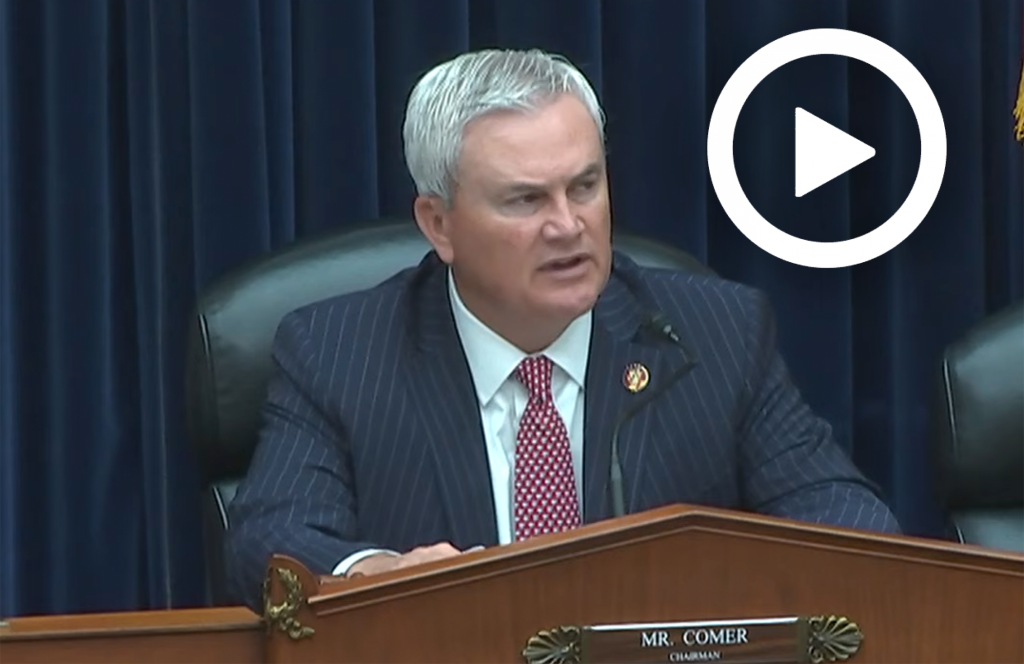Comer: OPM Must Be Transparent About Taxpayer-Funded Workforce
WASHINGTON—House Committee on Oversight and Accountability Chairman James Comer (R-Ky.) today delivered opening remarks at a hearing titled “Oversight of Our Nation’s Largest Employer: Reviewing the U.S. Office of Personnel Management, Pt. II” to examine how the U.S. Office of Personnel Management (OPM) is delivering services for the American people. Chairman Comer discussed how at the Oversight Committee’s last OPM Oversight hearing, then-OPM Director Kiran Ahuja was unable to provide clear answers to many of the lawmakers’ questions about the lack of accountability the Biden Administration has provided to the federal workforce, such as the impact of telework. Chairman Comer also pointed out how under the Biden Administration, OPM is attempting to insulate the federal bureaucracy from accountability.
Below are Chairman Comer’s remarks as prepared for delivery.
Last March, the Oversight Committee held a hearing with then-OPM director Kiran Ahuja, to conduct oversight of the Office of Personnel Management. Ms. Ahuja has since left OPM, so we are joined today by Mr. Rob Shriver, the acting director.
The rationale for today’s hearing is the same as it was last year: the federal government is our nation’s largest employer, and this Committee must ensure the OPM, and the civil service generally, deliver for the American people.
At least year’s hearing, what Members may remember most clearly is the inability of Director Ahuja to say how many federal employees were currently teleworking.
Since OPM was, and is, at the center of a major policy shift with respect to telework and remote work, that lack of knowledge struck Republicans as concerning.
Especially, as we heard last month, that the Biden Administration prides itself as being a data-driven organization.
I understand OPM has made progress adding telework data to its main HR system, but I still am curious to know what this translates into in terms of its having current, quality data upon which to base policy.
Also, as was discussed last month, there are several core themes that run throughout the entire Biden Management Agenda, two of which are empowering federal workers and federal employee unions.
We asked a number of questions of OMB regarding the data underlying the policies that stem from these themes. And I intend to do so again today.
For example, while the Civil Service Reform Act of 1978 may have said labor organizations and collective bargaining in the civil service are in the public interest, and the Biden Administration’s words and actions certainly suggest they are—it is important to know exactly how this might be the case.
What data or evidence do you have to illustrate how growing and empowering federal employee unions is in the public interest?
And directly in OPM’s purview…how does union membership impact federal workplaces and civil servants in them?
I also understand OPM has made progress improving retirement processing. I know that is an issue that impacts all offices, so I am eager to learn more about OPM’s efforts and what we should expect in the year to come.
But I will end with what is likely to be a frequent topic of conversation today.
In April, OPM issued its final rule Upholding Civil Service Protections and Merit System Principles, which is clearly an attempt to make it more difficult for President Trump to bring back Schedule F should he win a second term.
I support Schedule F, because I do believe federal employees—especially those with significant ability to influence whether an administration’s policies do, or don’t, get implemented—should be held to account.
We cannot allow the unelected federal bureaucracy to continue to think and act like it is running the show. There must be accountability.
The Biden Administration is having to deal with this now, as federal employees protest the President’s policies on telework and Gaza.
With the latter, there is talk about what they are able to do “on the inside…”
Well…what are they able to do on the inside?
Are they using similar tactics to those described by Trump Administration alumni to obstruct policies they do not like?
Do you know?
Is anybody looking?
OPM and the Biden Administration have made crystal clear they do not like Schedule F, but that implies you think the current system is working just fine to deal with all manner of disciplinary concerns.
And I have never heard anybody say that.
In closing, I look forward to your testimony, Mr. Shriver, and I thank you for being here today.
READ MORE: Hearing Wrap Up: Waste and Mismanagement at OPM is Reducing Services and Raising Costs for Taxpayers
Comer: OPM’s Final Rule Insulates the Federal Workforce from Accountability
